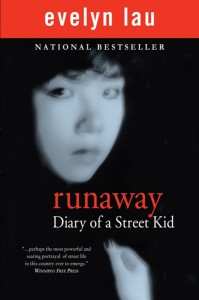 I finished Runaway: Diary of a Street Kid by Evelyn Lau at least a month ago. I’ve had a bit of blogger-block and had difficulties pinpointing my feelings about this book.
I finished Runaway: Diary of a Street Kid by Evelyn Lau at least a month ago. I’ve had a bit of blogger-block and had difficulties pinpointing my feelings about this book.
It’s very strange to read a non-fiction/memoir that takes place in your city. Add that to the fact that Evelyn Lau is a local author with whom I’ve spoken with at work … and it was really strange to read her story. I admire Evelyn so much for sharing her story and I am very glad I read it.
At the age of six, Evelyn Lau already knew what she wanted from life—to be a writer. Frustrated and discouraged by her parents, who forbade her to “waste” valuable study time writing, Evelyn ran away at the age of 14.
Seduced by the freedom and independence that life on the streets of Vancouver seemed to offer, she was soon trapped in a downward spiral of drug addiction and prostitution. During her two harrowing years on the street, Lau’s writing ambition never left her; almost obsessively, she kept a written record of her days on the street. This record is Runaway: Diary of a Street Kid.
Tragic, sometimes infuriating, but always honest and inspired, Runaway makes no apologies, passes no judgments, and offers no trite moral-of-the-story solutions. The result is a raw and vivid portrait of the life of a street kid.
Even as a 14-year-old, Evelyn Lau’s writing was extremely strong. It doesn’t read like your average memoir or even faux diary style. Evelyn Lau didn’t pick and choose the experiences she shares in the book. The events are being discussed in the present and the reality of street life is presented raw. Lau gives an honest account of her first year on the streets and the downward spiral she found herself in.
On the surface, the story was frustrating due to being a bit repetitive and disjointed, but underneath a lot more was happening. At one point, Lau writes, “I know that much of my writing is immature and self-absorbed, and that alone is enough to depress anyone. Depression is a brick sitting on top of your head, weighing down and compressing your thoughts into nuggets of lead. I’m scared to let anyone know how much I love them because then they would understand how lonely I am.”
Lau’s story is depressing and on the surface seems to be one long complaint, even when things are going her way. Sometimes you just want to shake her and say, “you’re making it worse!” but part of what struck me about the book was knowing that everyone needs to make their own mistakes. In the end, a diary is for yourself, and Lau’s memoir in Runaway proves that exact point. It is a raw look into life on the street, but —more to the point— it was Lau writing for herself, trying to figure things out.
“There is so much that I still dare to want to change. Everywhere I turn there is somebody who is innocent, who is doing good and who is being crucified for it.
I see myself going nowhere, running constantly, wishing to hide in a different personality, behind a different mask. Moving, but in circles. Trying to run away from life and from its eyesores that only the truly brave can face and attempt to change. It will go on and on: somebody being battered by rain down on Skid Row, on any street in any city, and people walking by. You give up after a while or else you go crazy.
Some people do beautiful things, once or twice in their lives, and create something for somebody else—a freedom, a glimmer of hope. Each of us measures happiness differently. If all of us could just be brought down to the lowest rung of existence, wouldn’t we understand better what happiness is about?
Another move. Barren walls. Going nowhere, leaving behind (now it seems, as it does each time) everything. The ashtray sitting lonely on the windowsill, smeared with ashes. The closet with one T-shirt hanging. Suitcases and backpacks waiting for morning.
I want to do something good in this world. I want a life for myself, a life not chosen at random and too easily disposed of, but a life that will create something concrete for people. It isn’t enough just to have visions but nothing in my hands to give.
I don’t know how to live reasonably. I don’t know how to stop from being hurt at the most insignificant things, from being overresponsive to people, except by shutting and locking doors firmly, checking them twice to make sure no one can penetrate. How does one manage?
I want people to be good to each other, but I don’t know how to begin changing anything because I myself can barely cope with other people and with being alive.”






May 8, 2011 at 10:12 pm
Wow…I couldn’t handle that right now. I need something less….life-like!
May 8, 2011 at 11:35 pm
Yes, it was quite intense to read.
May 14, 2011 at 12:09 am
You may wish to edit this: “because they they would understand how lonely I am.”, and please don’t publish my comment as it will be irrelevant once you’ve edited the post. Thanks!